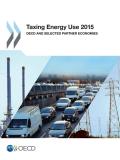This report, from the New Climate Economy, provides 10 practical recommendations to boost economic growth and reduce climate risk. These recommendations could deliver up to 96% of the emissions reductions required by 2030 to keep our planet on a pathway to keep global warming under 2 degrees celsius. And these are actions that would also deliver multiple economic benefits.
The report calls for stronger cooperation between governments, businesses, investors, cities and communities to drive economic growth in the emerging low-carbon economy. International and multistakeholder cooperation can scale up technological change, expand markets, reduce costs, address concerns about international competitiveness, spread best practice and increase the flows of finance.

The Little Green Data Book provides key environmental data for over 200 economies, based on the World Development Indicators 2015 and its online database. Over 50 indicators are used, organized into categories on: agriculture; forests and biodiversity; oceans; energy and emissions; water and sanitation; environment and health; and national accounting aggregates. Data is presented for the regions of East Asia and Pacific, Europe and Central Asia, Latin America and the Caribbean, Middle East and North Africa, South Asia, and Sub-Saharan Africa.
The 2015 edition uses two new air pollution indicators: mean annual exposure to suspended particulate matter less than 2.5 microns in diameter (PM2.5); and percentage of total population exposed to PM2.5 pollution above the World Health Organization (WHO) Air Quality Guidelines (AQG) value of an annual average of 10 microns per cubic meter. Previous editions used indicators focused on the larger particulates (PM10) and only on urban centers with more 100,000 persons.
Also incorporated this year, are estimates of the economic costs of air pollution, including household air pollution from cooking with solid fuels.
This report produced in co-operation between the Organisation for Economic Co-operation and Development (OECD), the International Energy Agency (IEA), the International Transport Forum (ITF) and the Nuclear Energy Agency (NEA) identifies the misalignments between climate change objectives and policy and regulatory frameworks across a range of policy domains (investment, taxation, innovation and skills, trade, and adaptation) and activities at the heart of climate policy (electricity, urban mobility and rural land use).
Outside of countries’ core climate policies, many of the regulatory features of today’s economies have been built around the availability of fossil fuels and without any regard for the greenhouse gas emissions stemming from human activities. This report makes a diagnosis of these contradictions and points to means of solving them to support a more effective transition of all countries to a low-carbon economy.

Energy is a critical input into the production and consumption patterns that support economic and social wellbeing. However, many forms of energy use contribute to the environmental and climate challenges societies face today. Taxation is a key tool by which governments can influence energy use to contain its environmental impacts. This report provides a systematic analysis of the structure and level of energy taxes in OECD and selected other countries; together, they cover 80% of global energy use.
This report builds on the 2013 edition of Taxing Energy Use, expanding the geographic coverage of the 2013 data set to include Argentina, Brazil, China, India, Indonesia, Russia and South Africa. The report describes energy use, taxation and pricing in these countries and presents detailed graphical profiles of the structure of energy use and taxation for each.
Shifting public and private investment from "brown" to "green" is an essential part of climate change. The post-2020 climate agreement to be agreed at COP 21 in December 2015 has the potential to play a significant role in signalling the importance of such a shift. This paper explores how the 2015 agreement could spur further mobilisation of climate finance by examining the current state of play regarding existing financing environments and mechanisms. These include examining the existing international institutional arrangements under the UNFCCC to see how balanced financing, co-ordination, streamlining and complementarity between institutions could be achieved. The paper also highlights the key role that in-country enabling environments can play in further mobilising public and private climate finance, and discusses how the 2015 agreement could enhance both "pull" and "push" factors for mobilisation. In addition, the paper also discusses how the agreement could facilitate the broad use of a spectrum of financial instruments and the further development of an enhanced system for measurement, reporting and verification of climate finance.
